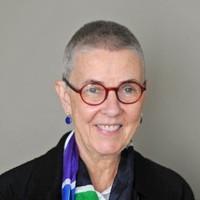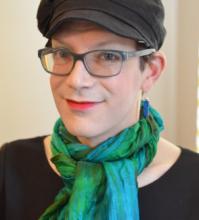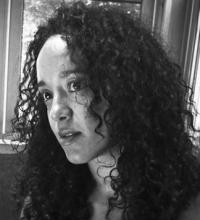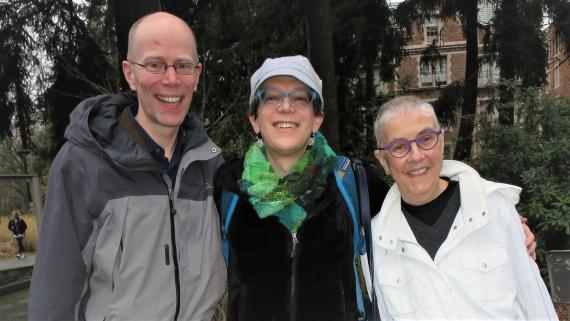Lee Scheingold Lecture in Poetry and Poetics

The first lecture on poetics in the Scheingold series featured the engaging, dynamic, and renowned Stephanie Burt. Burt’s Ph.D. in English is from Yale. She’s professor of English at Harvard, where she focuses on both poetry and poetics, and is one of the world’s foremost critics in the area of poetry and poetics. Needless to say, hosting Dr. Burt’s talk was an honor for our department. Her lecture on poetics centered on shipping containers and international trade as metaphors for the lyric poem and its journeys through places and time. In her own words:
Shipping containers have transformed the world economy and changed human use of the seas; reused on land, they also provide homes, emergency shelters, restaurants, shops, hotels, fire breaks, earthquake barriers, and even outdoor sculpture. I argue that shipping containers, in their contemporary importance and especially in their vernacular reuse, give us ways to think about the value and the persistence of lyric poetry, as a concept and as a poetic kind. We can find this analogy in recent discussion of lyric and form; we can also find in particular contemporary poems, some of which depict shipping containers directly, and more of which (some of them by major living writers) depict the work of poetry, the movement of forms, genres or personae from place to place or person to person, in ways that shipping containers can help us explain.

Before this inaugural lecture, Scheingold spoke briefly about her hopes for this ten-year series of visits from poets and poetry scholars. Her remarks focused on an incident while having dinner with a number of Humanities students when she suddenly realized that the two most important things in her life were “words, and loving people.”
After the death of her husband in 2010, Scheingold turned toward the UW as a place of solace. She took courses in the Senior Access program in the Slavic Department, becoming reacquainted with the Russian language and particularly with its poetry. From there, Lee began to take poetry courses at UW as well. With the guidance of James West, Carolyn Allen, Brian Reed, Charles LaPorte, Jeff Knight, and Jesse Oak Taylor, she began to write articles about poetry and how it could help her express the profound grief she was feeling. In this context the idea of a poetics lecture series was born. “My dawning awareness of how central to my life poetry had become, its deep affective resonance with my grief for Stuart, and then my writing, was central to my establishing this endowment,” Scheingold says. “I would really be delighted if the series increased interest in all aspects of poetic studies on campus.” All the previously listed faculty and many more people were central to this project coming to life, with front office administrator Karla Tofte playing a particularly central role.
Our second annual Scheingold Lecture in Poetry and Poetics, featuring Dr. Leanne Betasamosake Simpson and Dr. Alexis Pauline Gumbs, is scheduled to occur on Thursday, March 7, 2019 from 7:00-8:00 pm in Kane Hall room 220, with a book signing to follow from 8:00-8:30. Dr. Simpson and Dr. Gumbs will each share a short talk on poetry, poetics, and social justice, and then will be in conversation (please find professional biographies of both speakers at the end of this article). A reception will precede the lecture from 5:30-6:30 in the Walker-Ames Room (Kane Hall 225).

“And, of course, none of this could happen without Lee Scheingold’s generosity. Lee’s gift is making it possible for us to think about not only who we invite to share work but also about how these lectures might encourage other conversations around poetry and poetics within the English Department, with other programs and departments outside of English, and with communities outside of UW.”
We hope you can all join us in March for this ground-breaking event.
Leanne Betasamosake Simpson is a renowned Michi Saagiig Nishnaabeg scholar, writer, and artist, who has been widely recognized as one of the most compelling Indigenous voices of her generation. Her work breaks open the intersections between politics, story and song—bringing audiences into a rich and layered world of sound, light, and sovereign creativity.
Working for over a decade as an independent scholar using Nishnaabeg intellectual practices, Leanne has lectured and taught extensively at universities across Canada and has twenty years experience with Indigenous land based education. She holds a PhD from the University of Manitoba, is currently a Distinguished Visiting Scholar in the Faculty of Arts at Ryerson University and faculty at the Dechinta Centre for Research & Learning in Denendeh. Leanne's books are regularly used in courses across Canada and the United States including Dancing on Our Turtle’s Back, The Gift Is in the Making, Lighting the Eighth Fire (editor), This Is An Honour Song (editor with Kiera Ladner), and The Winter We Danced (Kino-nda-niimi editorial collective). Her latest book, As We Have Always Done: Indigenous Freedom Through Radical Resistance, was published by the University of Minnesota Press in the fall of 2017 and was awarded Best Subsequent Book by the Native American and Indigenous Studies Association.
Alexis Pauline Gumbs: A queer black troublemaker, a black feminist love evangelist, and a prayer poet priestess, Alexis has a PhD in English, African and African-American Studies, and Women and Gender Studies from Duke University. She was the first scholar to research the Audre Lorde Papers at Spelman College, the June Jordan Papers at Harvard University, and the Lucille Clifton Papers at Emory University during her dissertation research.
She is the author of Spill: Scenes of Black Feminist Fugitivity, also published by Duke University Press; coeditor of Revolutionary Mothering: Love on the Front Lines; and the founder and director of Eternal Summer of the Black Feminist Mind, an educational program based in Durham, North Carolina. Following the innovative collection Spill, Alexis Pauline Gumbs's M Archive—the second book in a planned experimental triptych—is a series of poetic artifacts that speculatively documents the persistence of Black life following a worldwide cataclysm. Engaging with the work of the foundational Black feminist theorist M. Jacqui Alexander, and following the trajectory of Gumbs's acclaimed visionary short story “Evidence,” M Archive is told from the perspective of a future researcher who uncovers evidence of the conditions of late capitalism, antiblackness, and environmental crisis while examining possibilities of being that exceed the human.
